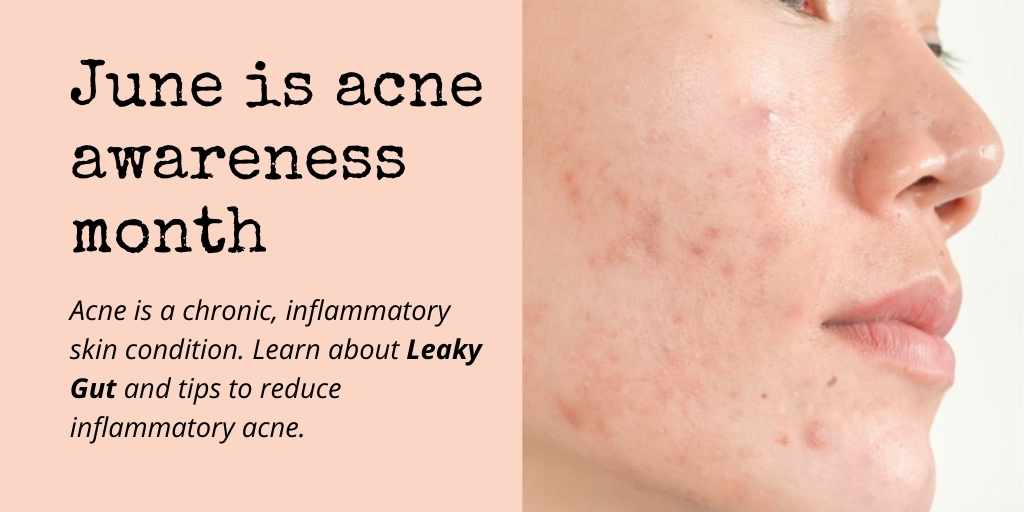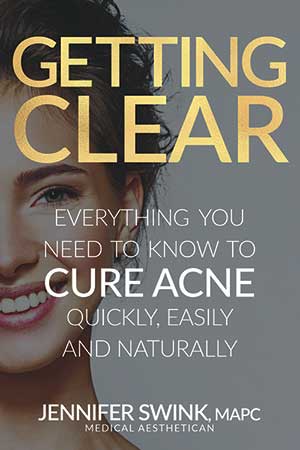
Typically, chronic acne sufferers have tried it all with little to no long-term success. There are literally thousands of acne skincare products and procedures that promise to clear your skin. Acne advice is everywhere from department stores, Internet, television, magazines, and your best friend, all claiming their way is the solution. You would think acne would be decreasing with all of this expert advice.
Instead, acne is on the rise globally. As more countries have become Westernized, the incidence of acne has increased exponentially. The American Academy of Dermatology estimates 50 million Americans suffer from acne. Fifty percent of adult women and 25 percent of adult men have some form of acne.

Getting Clear: Everything You Need To Know To CURE ACNE Quickly, Easily, and Naturally
GETTING CLEAR IS THE BOOK FOR ACNE SUFFERERS WHO HAVE TRIED CONVENTIONAL ACNE TREATMENTS AND FAILED.
Jennifer Swink, top-ranked medical aesthetician, helps you understand the underlying causes of your acne and how to cure it quickly, and permanently.
Inflammation, the real culprit
I am an aesthetician with decades of experience in my field. I have done extensive research on acne and how to treat it most effectively. Some of the information I found may shock you, and some of it may make perfect and logical sense. Either way, this information will help you get to the bottom of your acne once and for all.
The American Academy of Dermatology defines acne as a chronic, inflammatory skin condition. Chronic inflammation is also the cause of many diseases such as diabetes, coronary artery disease, Alzheimer’s, rheumatoid arthritis and Crohn’s disease, plus many more. The number of serious illnesses in the United States caused by chronic inflammation has skyrocketed and directly correlates to our eroding dietary intake over the last 50 years or so. I believe that the main causes of inflammation are diet and lifestyle. Wouldn’t then seem logical to assume reducing your inflammation will reduce your acne. Right?
Diet includes the types of food and water you consume and medications you may be taking.
Lifestyle addresses the amount and types of stress you experience, toxins to which you are exposed, and your sleep and exercise habits.
These influence our overall health, both physical and mental. All of these factors directly impact your inflammation levels, digestive health and consequently cause acne.
What your gut can tell you
One of the main areas our bodies take a major hit from diet and lifestyle is in our digestive health. An unhealthy gut is the real culprit in causing much of the inflammation we experience. What do I mean by “gut”? Your gut is part of the digestive system from mouth to anus, in other words, your gastrointestinal tract and all the organs along the way that help to keep us alive and healthy. We are a microbiome that consists mostly of bacterium that serve healthful roles in our guts. Your gut bugs, also known as intestinal flora, are just as vital to your health as your brain.
Diverse strains of good bacteria help digest food and absorb nutrients, help fight against bad bacteria and harmful viruses and serve to neutralize and detoxify harmful substances. These little friends produce and release vitamins, enzymes and neurotransmitters that keep our bodies happy and help us sleep well at night. FUN FACT: The American Psychological Association reports ninety-five percent of serotonin is manufactured by specific bacteria in our gut. Gut bugs help to mitigate our stress and its effects on our hormonal system. Healthy, diverse intestinal flora reduces inflammation and its devastating effects on the body, one of which is acne.
In my research, I have learned that the corruption of our food supply has demolished our digestive health. The problem is what we’re eating. Processed foods and the surplus of sugars, hybridized grains, gluten, dairy, genetically modified foods (GMO’s), food additives, artificial sweeteners, chlorinated and fluoridated water, pesticides, plastics, parabens, aspirins, antibiotics and the physical stresses they put on our bodies cause massive amounts of inflammation. These foods (if you can call them that), not only kill off the quantity and diversity of your healthy flora, but also help multiply the growth of bad bacteria, yeast, parasites and viruses that wreak havoc on your gut’s health and excrete endotoxins that cause inflammation. This can lead to a condition called “Leaky Gut Syndrome.”
What is Leaky Gut Syndrome?
Leaky Gut Syndrome (intestinal hyperpermeability) occurs when junctions in the intestinal wall malfunction and allow unwanted allergens and substances (food particles, chemicals and other things) to leak into the bloodstream. This can cause a cascade of events, one of them being INFLAMMATION. Over time, if this condition persists, it can affect your skin and lead to various autoimmune disorders. Acne, vitiligo, psoriasis, rosacea, eczema, scleroderma and rashes are symptoms of leaky gut and possibly autoimmune disease.
If you have any diseases related to inflammation and/or an autoimmune disorder, you can safely assume you have leaky gut. If you have not been officially diagnosed with any medical conditions, start looking for these signs and symptoms of leaky gut before it turns into something much more serious than your acne.
- Bowel issues – gas, bloating, chronic constipation, diarrhea or indigestion
- Allergies – food sensitivities
- Inflammatory skin conditions – acne, eczema, psoriasis, skin rashes, rosacea
- Mood issues – depression and anxiety
- B12, magnesium, iron or zinc deficiency
- Bladder infections
- Chronic joint and muscle pain
- Weight gain, for example, Syndrome X
- Fatigue
- Frequent colds
Ok, so what can I do to reduce inflammation and heal my “Leaky Gut?”
Remove inflammatory foods such as:
- Reduce processed foods/refined carbohydrates- too much sugar negatively impacts gut barrier function
- Reduce high-fat foods
- Reduce foods that may trigger allergies or sensitivities, such as wheat, gluten, dairy and soy (At least 3 months).
- Reduce alcohol intake – alcohol increases intestinal permeability
- Reduce use of NSAIDS/Non steroidal anti-inflammatory drugs such as aspirin, Ibuprofen, and naproxen as it increases intestinal permeability.
- Reduce stress levels
- Quit smoking- Tobacco smoke increases digestive tract inflammation and risk factor for a number of bowel conditions
Add foods to help promote healthy bacteria in your gut. Some examples include:
- Kefir
- Kimchi
- Sauerkraut
- Bananas
- Berries
- Spore-based probiotics
- Increase your intake of high-fiber foods- The soluble fiber found in vegetables, legumes, and fruit support your gut’s beneficial bacteria.
- Omega 3’s
- L-Glutamine
How long does it take to heal Leaky Gut?
It can depend on may different factors such as how damaged the gut lining is, how long has it been damaged, how old are you, what other conditions may be going on at the same time, how much are you willing to change your diet and lifestyle (strict or loosely goosey)? Most health experts say an average is about one year. I have seen improvement in my clients skin in as little as a couple of months.


